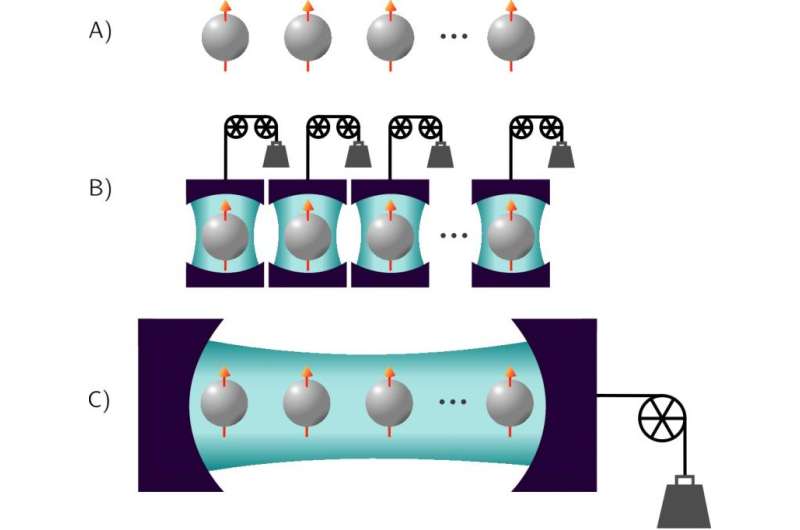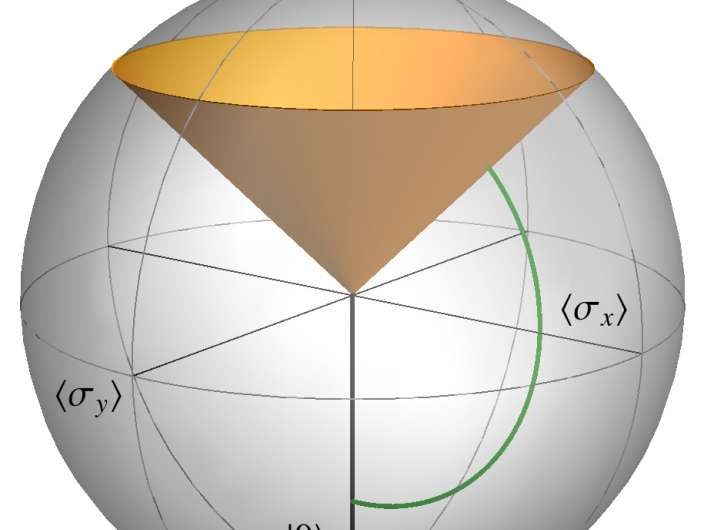August 3, 2015 feature
For faster battery charging, try a quantum battery?

(Phys.org)—Physicists have shown that a quantum battery—basically, a quantum system such as a qubit that stores energy in its quantum states—can theoretically be charged at a faster rate than conventional batteries. This "quantum speedup" arises from quantum entanglement among multiple qubits, which essentially provides a shortcut between the qubits' uncharged and charged states, allowing for faster charging.
The physicists, Felix C. Binder, et al., have published a paper on the quantum battery, which they call "quantacell," in a recent issue of the New Journal of Physics.
"There has been much interest in the question if quantum physics can provide any advantage in thermodynamic processes (thermodynamics being the study of work and heat and their interconversion)," Binder, a physicist at the University of Oxford, told Phys.org. "Our paper demonstrates with an example that a significant advantage can indeed be achieved when a short process duration is desired—quantum correlations ('quantum entanglement') can lead to a significant speedup."
The scientists investigated a quantum battery made of qubits, which can take a variety of physical forms, such as ions, neutral atoms, photons, etc. Qubits can exist in either one of two states or a superposition of both states at once. In a quantum battery, the two states represent different energy levels. Charging a quantum battery means changing a qubit's state from a lower energy level to a higher energy level, while using (discharging) the battery does the reverse. The scientists call these particular qubits "work qubits" (or simply "wits") because they can store energy that can later be used to do work.

So far, this description is similar to how a conventional battery works. However, the important difference is that, as quantum systems, qubits may be entangled, meaning the qubits are so strongly correlated that an entire qubit array can be described by the same quantum state. Here, the researchers have shown that one consequence of entangling the qubits during the charging process is that it means a shorter distance has to be traveled through state space—that is, between the low and high energy states—than would be required without entanglement.
The scientists showed that, the more qubits, and hence the more entanglement, the faster the charging process. In the example protocol, the charging time is inversely proportional to the number of qubits. So hypothetically, if one work qubit took an hour to charge, six work qubits could be charged in 10 minutes. In reality, however, typical quantum systems cannot remain quantum for anywhere near this length of time due to decoherence—interactions with the surrounding environment that destroy the quantum effects.
Besides decoherence, another roadblock to using quantum batteries for real-life applications is that the amount of energy that they can store is tiny compared to the energy needs of, for example, mobile phones or electric vehicles.
"The energies of quantum systems tend to be many orders of magnitude smaller than even the smallest energies used by day-to-day appliances," explained coauthor John Goold, a physicist at The Abdus Salam International Centre for Theoretical Physics in Trieste, Italy. "'Size' is here a question of energy scales. Our study is a theoretical proof-of-principle that quantum physics can provide a speedup in depositing energy into a system. These speedup effects would be relevant in two cases: 1) Mechanical devices become small enough that energy scales are comparable to current implementations of quantum systems. 2) Quantum systems are scaled up and robustly controllable at energy scales that are of practical importance."
To better understand the potential applications of quantum batteries, the researchers plan to further investigate the quantum effects of thermodynamic processes. The big question is, can a quantum battery produce work (directed energy) rather than simply heat (disordered energy)?
"What we call 'quantum batteries' in the paper exists in labs: Any controllable quantum system with stable energy eigenstates can be understood as a battery," Binder said. "The question is rather if the thermodynamic viewpoint will be helpful for quantum experiments with systems like ions, cold neutral atoms (for instance, on an optical lattice), condensed matter systems (for example, superconducting qubits and circuit quantum electrodynamics), or light."
More information: Felix C. Binder, et al. "Quantacell: powerful charging of quantum batteries." New Journal of Physics. DOI: 10.1088/1367-2630/17/7/075015
Journal information: New Journal of Physics
© 2015 Phys.org




















